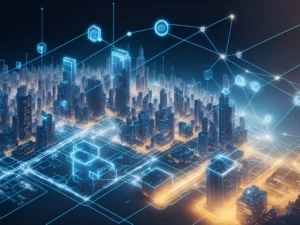The AI Revolution: Transforming Industries and Shaping the Future
As we navigate an era defined by unprecedented technological advancements, the AI revolution emerges as a powerful force reshaping industries and altering the trajectory of human progress. With its ability to analyze, learn, and make data-driven decisions, artificial intelligence (AI) is poised to transform our lives in profound and exciting ways. Let’s dive deeper into the impact of the AI revolution, its implications for society, and the boundless opportunities it presents.

Driving Forces Behind the AI Revolution
Explosion of Data
The exponential growth of data plays a pivotal role in the advancement of AI technology. Modern AI systems thrive on data, which serves as the foundation for their learning and decision-making processes. The proliferation of data sources, from social media to IoT devices, has enabled the development of highly sophisticated AI algorithms capable of making accurate predictions and improving over time.
Enhanced Computing Power
Progress in computing resources, including high-performance computing, cloud infrastructure, and specialized hardware like GPUs and TPUs, has been instrumental in advancing AI research. These innovations enable the training of complex AI models, pushing the boundaries of what AI can achieve.
Advances in Machine Learning
Machine learning, a core component of AI, has undergone remarkable evolution. Techniques such as deep learning, natural language processing, and reinforcement learning have opened up new avenues for AI applications across industries, from healthcare to finance.
Transformative Applications of AI
Automation and Efficiency
AI-powered automation is revolutionizing industries by taking over repetitive and mundane tasks. Robots and intelligent systems are enhancing productivity in manufacturing, logistics, and customer service. These advancements lead to reduced operational costs, increased safety, and higher efficiency. While concerns about job displacement exist, AI also creates opportunities for more meaningful human roles.
Revolutionizing Healthcare
In the healthcare sector, AI is a game-changer. AI algorithms analyze vast amounts of medical data, enabling accurate diagnoses and personalized treatment plans. Robotic-assisted surgeries and AI-driven drug discovery are paving the way for groundbreaking advancements, improving patient outcomes and transforming medical research.
Personalization and Recommendations

AI-driven personalization is enhancing user experiences across platforms. Streaming services, e-commerce websites, and digital marketing platforms leverage AI to analyze user preferences and deliver tailored recommendations. This not only boosts customer satisfaction but also strengthens brand loyalty and drives revenue.
Autonomous Transportation
AI is at the forefront of transforming transportation. Autonomous vehicles promise safer roads, reduced traffic congestion, and optimized fuel consumption. AI-powered traffic management systems dynamically adjust routes and signals, improving urban mobility and reducing environmental impact.
Financial Industry Innovations
AI is streamlining processes in the financial sector. Fraud detection, credit scoring, and investment management are becoming more efficient with AI algorithms that can analyze large datasets for patterns and anomalies. Robo-advisors offer personalized investment advice, democratizing financial services.
Customer Service Evolution
AI-powered chatbots and virtual assistants are revolutionizing customer service. By leveraging natural language processing and machine learning, these systems provide real-time assistance, handle a high volume of inquiries, and ensure 24/7 support. This leads to enhanced customer satisfaction and operational efficiency.
Ethical Challenges and Considerations
While AI presents immense potential, it also raises ethical concerns that must be addressed to ensure its responsible development and use:
- Privacy and Security AI systems often rely on sensitive data, raising questions about data privacy and security. Robust measures must be in place to protect user information.
- Algorithmic Bias Bias in AI algorithms can lead to unfair outcomes. Ensuring fairness, accountability, and transparency is crucial to prevent perpetuating societal inequalities.
- Transparency and Explainability Complex AI models often operate as “black boxes,” making it challenging to understand their decision-making processes. Transparent AI systems are essential to build trust and foster adoption.
Opportunities in the AI Era
The AI revolution presents unprecedented opportunities for innovation and growth:
- For Entrepreneurs: AI enables the automation of processes, cost optimization, and the development of new products and services. Businesses can harness AI to gain a competitive edge.
- For Individuals: Acquiring skills in AI and machine learning is invaluable in this era. The demand for AI specialists, data scientists, and ethical AI experts is surging, offering fulfilling and lucrative career paths.
- For Society: AI can address global challenges, from climate change to healthcare disparities. By leveraging AI responsibly, we can create solutions that benefit humanity at large.

FAQs
1. What is the AI revolution? The AI revolution refers to the transformative impact of artificial intelligence technologies on industries, society, and our daily lives. It encompasses advancements in AI capabilities, applications, and the opportunities and challenges they bring.
2. How is AI transforming industries? AI is enhancing efficiency, enabling automation, and driving innovation across industries such as healthcare, transportation, finance, and customer service. It helps businesses optimize processes, improve decision-making, and deliver personalized experiences.
3. What are the ethical concerns associated with AI? Key ethical concerns include data privacy, security, algorithmic bias, and the transparency of AI systems. Addressing these challenges is crucial for ensuring the responsible development and deployment of AI technologies.
4. How can individuals prepare for the AI era? Individuals can prepare by acquiring skills in AI, machine learning, and data science. Pursuing education and training in these areas will open up career opportunities and enable them to thrive in a technology-driven world.
5. What are some examples of AI applications? Examples include AI-powered automation in manufacturing, personalized recommendations on e-commerce platforms, autonomous vehicles in transportation, AI-driven diagnostics in healthcare, and AI-based fraud detection in finance.
6. Will AI replace jobs? While AI may replace some repetitive tasks, it also creates new opportunities for meaningful human roles. Upskilling and adapting to changes in the job market are essential to leverage AI’s potential.


